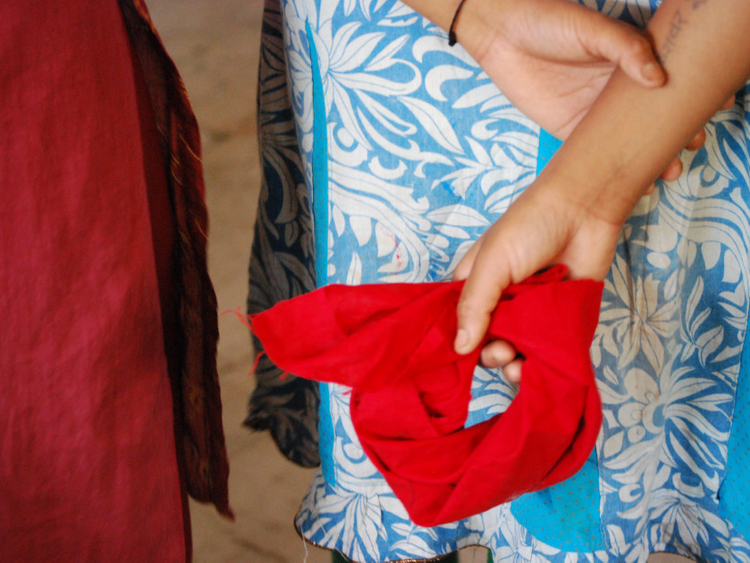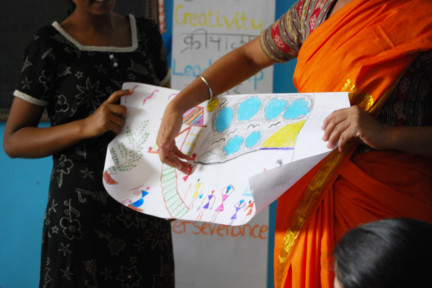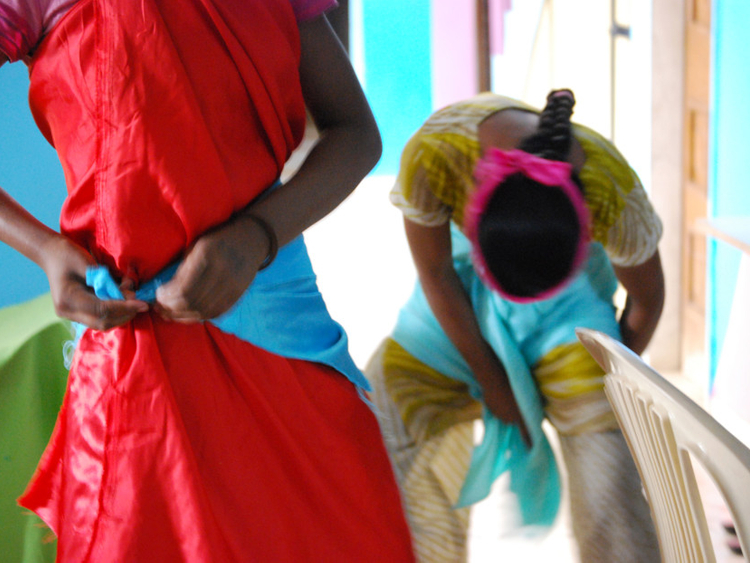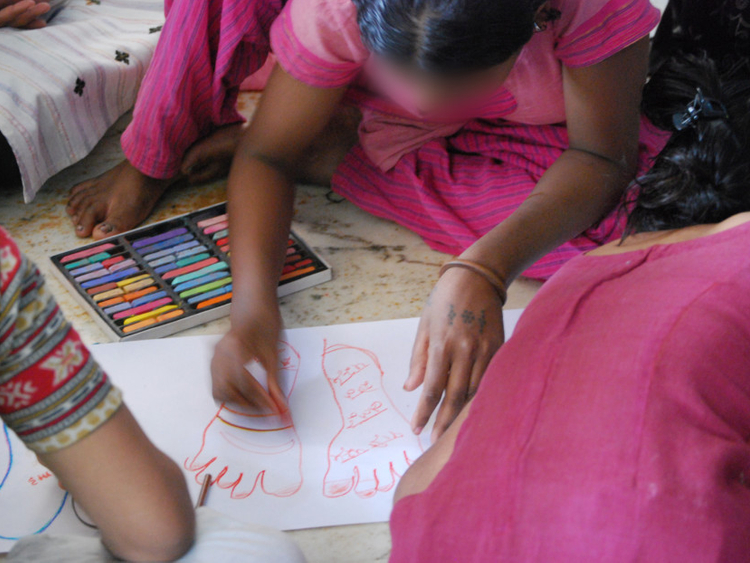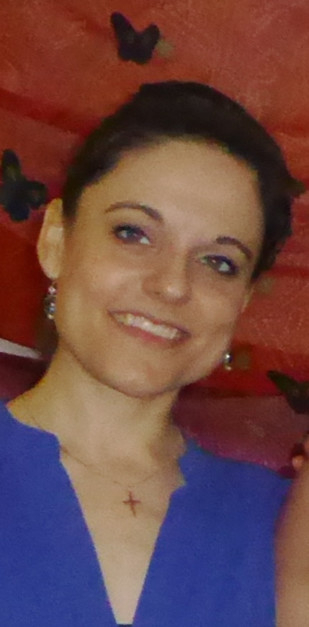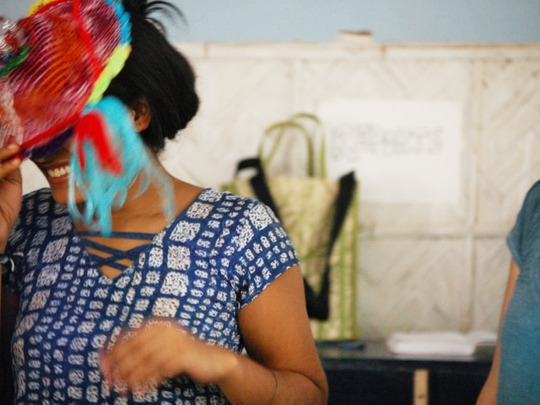
Last January, child sex trafficking survivor Margeaux Gray presented perhaps the most powerful testimonial at the US Senate on what should be done to end modern slavery.
Gray, who endured a 13-year ordeal after she was auctioned off to a willing buyer and sexually abused — a scenario that played out repeatedly in hotel rooms and private homes until she finally escaped at 18, said: “A trafficking survivor is never completely free until they are rid of the after-effects...”
The brief pauses in between her sentences allowed all in attendance to reflect on the unbelievable devastation of these crimes and on the strength of the human spirit.
“We need help. I personally would not have been able to heal without art therapy, even after I had escaped.” It was an attestation that she’s alive because of her art. Today, Gray is an independent anti-trafficking activist and policy advocate.
British actress Amanda Root knows the art, lives it and understands it well. And like a true artist, she has picked up the bullhorn to restore the dignity of survivors of the most horrifying crimes imaginable through creative activity. But, it is not all song and dance.
For Root, who played the heroine Anne Elliot in “Persuasion” — a lyrical, autumnal story of lost love, with the unexpected reward of a happy ending — the transition from one to the other has been easy.
“At the heart of every actor is an advocate, a passion to convey the role we are playing with authenticity. I have always had a sense of the power of the creative arts to engage and connect us, to bring new meaning and insight, and to be therapeutic and healing,” says Root, founder of Talitha Arts, a UK-based, non-profit group, which for the past four years has been helping to transform lives of girls rescued from trafficking and violence.
“We bring our specialised skills in drama, movement, art and music to design therapeutic creative workshops that are liberating, transforming and healing,” says the versatile period actress Root, who also starred in “The Iron Lady” and “Jane Eyre” among others.
At present, there are over 25 arts practitioners actively working with Talitha, conducting workshops for girls rescued by International Justice Mission (IJM), a global organisation founded in 1997 to end sex trafficking, forced labour and child sexual assault in Africa, Latin America and Asia.
Creative activity has been an effective tool for emotional and physical trauma survivors, according to Root. “Arts transcend language and it is often much easier for trauma survivors to respond non-verbally than verbally,” she says.
Root led fellow British actress Cathy Sara, best known for her role as Mrs Drake on British period drama “Downton Abbey”, to join the cause. On her first session with the girls, Sara says, she discovered transformation can happen through creative arts. “The workshops engage each girl in a different way and the flexibility and openness that I bring as an actress is very valuable.”
With nearly 2 million children exploited in the global sex trade, human trafficking is the fastest growing criminal enterprise in the world. This, despite the fact that international law and the laws of 134 countries criminalise sex trafficking. Helping the survivors of sex trafficking, who withstood daily degradation of mind and body, is crucial, possibly more so today than ever.
“Put simply, the figure of those in slavery has increased again. However, at IJM, we are finding increased reception by government officials and police officers wanting to tackle it, particularly in India, and so whilst the accuracy of reporting is improving, so too is political will and the desire to address the problem,” says Rebekah Hill of IJM, which established its first long-term field office in Mumbai in 2000, and now has offices in Kolkata, Chennai, Bangalore and Delhi.
With each team being built after assessing the balance of skills and personality types, Sara, head of overseas development at Talitha, says leadership and experience of the team members are equally important. “Our teams are made up of two creative professionals and one therapist. Each team is unique and therefore delivers a unique programme, which plays to the strength of the members.”
Then there is the fact that “whilst they are victims of hideous exploitation and abuse, they are also just young girls who love Hannah Montana and Justin Bieber,” says dance-movement therapist Kate Snowden. “They can connect to themselves using a combination of music and dance, which raises their endorphin levels, thereby lifting their mood, and allowing them the freedom to dance as most teenage girls love to.”
Trained at the Royal Ballet School in London, with a Masters in dance-movement psychotherapy, and having worked for six years at an outreach project for women in prostitution and victims of trafficking in the red light district of Berlin, Talitha was a natural progression for Snowden. “I have always been aware of the therapeutic value of the creative arts and experienced this myself as a dancer. I feel incredibly privileged to be able to pursue my passion to see restoration in the lives of these vulnerable young women.”
The vast majority of these girls come from backgrounds in poverty, susceptible to traffickers’ schemes of deception because the desperation of their economic situation makes them (or their parents) more willing to take risks such as accept a perpetrators’ fraudulent job offer or marriage proposal, to move to another location or migrate to another country. Once trafficked, they find themselves facing sexual violence as a constant threat.
Firm to her belief, Snowden knows that art connects humans, with music and dance as a medium. It’s an effective communication tool that engages the heart and mind but does not require words to be understood, especially for the traumatised girls who “hold” a lot of anxiety in their bodies due to the fear they have endured over a long period of time.
“A young girl who has been repeatedly sexually abused usually has a damaged relationship with her body. They often feel dirty or ashamed, many self-harm and the majority struggle to even stand up straight and express themselves physically. The dance, movement activities begin to give them an experience of using their bodies in a different way; to create and express what they are feeling.”
Since trauma impacts each survivor in different ways, Talitha explores different art forms, rather than just one, says Sara. “We offer each girl opportunities to express themselves in many different non-verbal ways. We help them to reconnect with their unique identity, no longer defined by their experiences and find meaning and hope through exploring symbols, metaphors, stories — and healing comes through expressing their individual cultural identity.”
Art therapy is not an exercise to speed up rehabilitation because while with some girls progress can be seen within the first session, for others, it takes longer.
“We encourage them to go at their own pace and do not force them to take part in any of the activities. This is tremendously empowering and therapeutic in itself. It not only fosters freedom, but is also a direct contradiction from the abusive control which has been such an awful part of their time prior to rescue,” says Snowden.
Understanding challenges like these means the positive impact of art therapy depends on ensuring that programmes are long term. While the girls begin to find their voices in the safe comfort of art, therapy helps survivors to rebuild their lives. “As we re-establish significance, potential and value, we liberate the possibility of hope. These are the resiliences that empower and enable survivors on their continued journey of transformation and healing. We also leave structures and activities that can be reworked and revisited, equipping girls with resources that can be sustained for a long time,” says Root.
Simple breathing techniques, activities that deepen emotional understanding and build life skills, exercises that develop physical confidence, or improve communication and relational skills are their lifelong resources. The workshops also involve therapeutic creative activities using clay-sculpture, drama and guided imagery to help the girls with anxiety. “They also have an opportunity to reflect verbally on their group and individual processes,” says Snowden.
Playing Queen Victoria in “The Black Prince”, written and directed by Kavi Raz about the life of Duleep Singh — the last Maharajah of the Punjab — which is being currently filmed, Root says, “We are always heartened to hear how girls replicate our activities in our absence or pass them down to others in their community.”
In recent years, as a way to engage those who have experienced trauma, art therapy — from drawing to puppet theatre — has been used by many organisations as an integral part of the rehabilitation process. But despite extensive research by therapists and academics, there is disparity between how some aid organisations and NGOs are embracing, or ignoring, its potential. Consequently, there is lack of funding as donors are unprepared to invest.
Fortunately, for Talitha it has been good so far. “We have generated a lot of interest for our work as people’s hearts are touched by the issues we are dealing with. This means we have managed to fund our trips through donors and fundraising activities. We are all volunteers and that enables us to do what we do,” says the Talitha founder.
Despite being hidden in plain sight, trafficking is real and tangible. And apart from art therapy and other trafficking prevention tools, Root feels a healthy care system is vital to protect the child so that they are not forced back into the criminal underworld.
“Change the tide of thinking. Invest in those national organisations that are working to transform communities and justice systems from the inside. One community at a time. No change is too small to celebrate,” says Sara.
Indeed, no step in the right direction is ever too small. At present, IJM has over 4,000 survivors in aftercare homes and more than 700 perpetrators of this heinous crime were convicted.
In India, IJM has freed 2,266 children, men and women from forced labour in 2013. For over a decade, it has been partnering with local police to rescue young women trafficked for sex and ensuring the traffickers, brothel managers and pimps are held accountable for their crimes. Funded by Google, IJM does not just provide immediate crisis care on the night of rescue, but continues to support the sex trafficking survivors as they settle into long-term aftercare homes.
Praising the efforts and commitment of Talitha, chief executive of IJM UK Terry Tennens says, “They play a valuable role in the work of justice and IJM is excited to see how these girls will continue to thrive and grow as a result of Talitha’s involvement in their lives”
“It is clear from Talitha’s work,” adds Tennens, “that art therapy is vital in helping the girls develop a sense of identity as well as helping them on their journeys of healing.”
Talitha professionals, who visit India twice a year, also trained aftercare workers and therapists in Mumbai and Kolkata. “We conduct a programme of eight sessions with girls in care homes. We are also able to take two teams per trip facilitating our programme in two cities concurrently,” says Root.
Having visited India for the sixth time, focusing on Mumbai and Kolkata — cities with the highest density of trafficking and children in the sex-trade, Sara says their last trip in October was “very fruitful”.
“We had a very engaged group of 22 girls who made good progress over our eight sessions with them. We always return to the UK with hope-filled stories.”
Taking time out for her busy day job, Sara, who is geared up to record BBC radio drama “Rumpole of the Bailey”, alongside Benedict Cumberbatch, and play an English Victorian artist in an as-yet-untitled film, now wants to take Talitha’s expertise to other parts of the world.
“We are developing our casework in the UK to work with vulnerable young people and juvenile ex-offenders, training more aftercare workers to use our approach, as they are hungry for tools to engage survivors before verbal therapy can be effective.
“Ultimately, we would like to do ourselves out of a job by training and empowering hubs of creatives and therapists in these hotspots who together can reach as many girls as possible in each city,” adds Sara.
“We have done most of our work in India so far but we hope to go to South America and Southeast Asia in future. We want to serve wherever there is a need or we might be useful,” says Snowden.
Recalling her experience in Mumbai earlier this year, Snowden says, “While working in an aftercare home for young girls rescued from trafficking in January, we created a short warm-up dance to help them connect to their bodies and move rhythmically. I used Pharrell Williams’ hit song ‘Happy’ for this activity and leading our 24 girls in this dance was the best five minutes — the joy on their faces as they danced was so beautiful. Every day, I am impacted by their courage, strength and joy in spite of such suffering.”
For Root, working with the girls for the past three years has been the most satisfying period in her life. “To witness young girls who have suffered so horrendously begin to gain confidence and hope through our workshops, rediscover their voice and potential has been rewarding. We are only a drop in the ocean but I have hope and faith in the power of the ripples.”
And the truth is, big, real, long-lasting and significant changes come from small beginnings. While traffickers prey on the hopes and dreams of those seeking a better life, Talitha is going all out in its fight to put those hopes and dreams back within reach.
Fact file
• 27 million children, women, and men are held as slaves today
• Human trafficking is the second-largest and fastest-growing criminal industry in the world
• Sex trafficking drives significant profits for perpetrators — a subset of the $32 billion (Dh117.5 billion) market value of illicit human trafficking, according to the US Department of Health and Human Services
• There are an estimated 29.8 million people in slavery today
• 1 in 5 women is victimised by rape or attempted rape in her lifetime
• The ILO estimates that 2.4 million people were in forced labour as a result of human trafficking
• In 2013, 239 young women and girls were rescued from sex trafficking in India, Cambodia and the Philippines by IJM.
• According to WHO, school is the most common place for sexual violence for massive populations of poor girls in the developing world
• According to ILO, children below the age of 18 years represent an estimated 29.826 per cent of all forced labour.
• 58 per cent of school children in Kenya have been sexually harassed (CICE Hiroshima University)
Suparna Dutt-D’Cunha is a writer based in Pune, India



